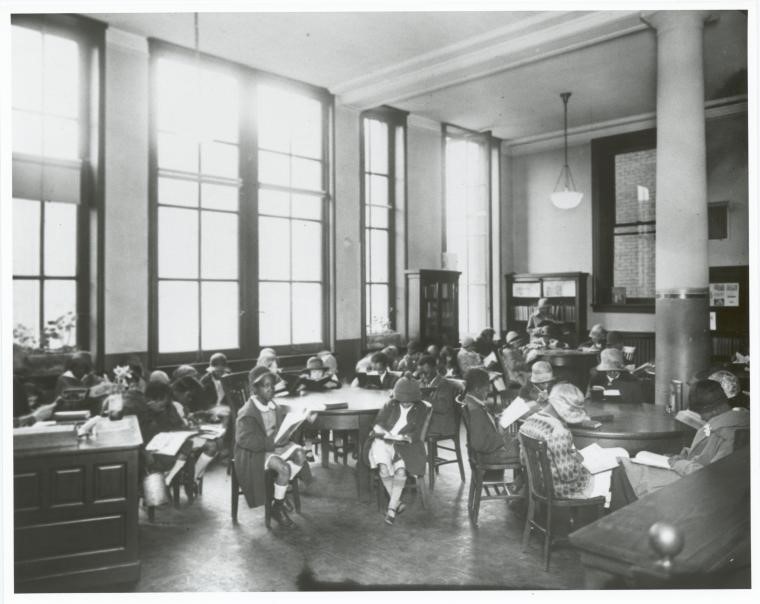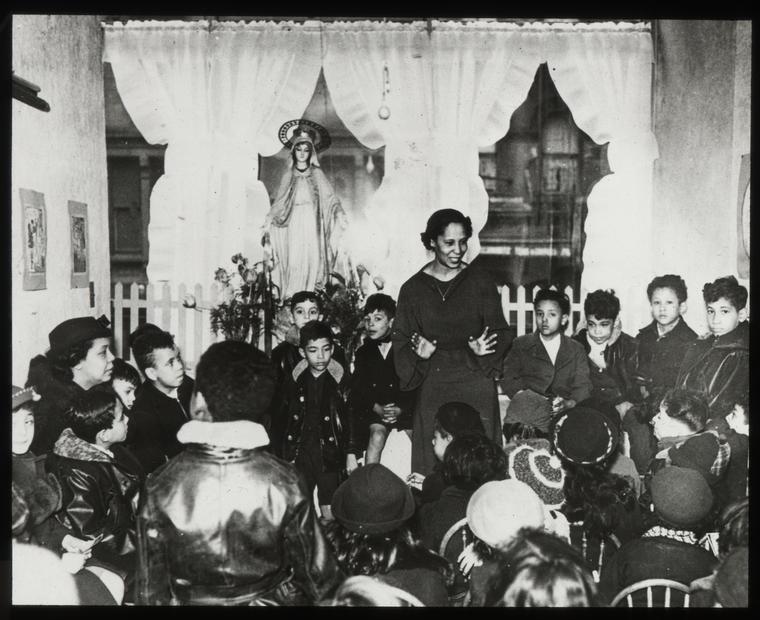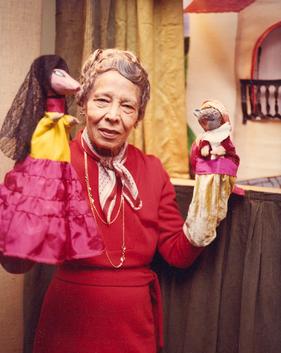Pura Belpré: The Librarian Who Brought Puerto Rican Folktales to Life
Hidden Voices began as a collaboration with the Museum of the City of New York that was initiated to help City students learn about the countless individuals who are often “hidden” from traditional historical records. Each of the people highlighted in this series has made a positive impact on their communities while serving as outstanding examples of leadership, advocacy, and community service.
Today, in celebration of Hispanic Heritage Month, we’re sharing the story of children's librarian and author Pura Belpré, a barrier-breaking storyteller who dedicated her life to ensuring the Puerto Rican children in New York were well-represented in the books on the shelves of the New York Public Library.
In August 1920, a young woman named Pura Belpré traveled from Puerto Rico to New York City to attend her sister’s wedding—a trip that would not only change the course of her own life, but have a ripple effect on the field of children’s literature for decades to come.
Belpré was born in 1903 in Cidra, Puerto Rico into a family of storytellers, learning about and listening to Puerto Rican folklore throughout her childhood. She would grow up to graduate from Central High School in Santurce—an impressive achievement for a young woman of her time—and enroll in a teaching program at the University of Puerto Rico, where she was a student when she first arrived in New York.
But rather than returning to her life in Puerto Rico after her sister's nuptials, Pura Belpré made the pivotal decision to stay in the United States, joining thousands of her countrymen as part of the first large wave of Puerto Rican migrants—los pioneros—to relocate to the continental United States. Like Belpré, many ultimately settled in New York City, where the Puerto Rican population increased from roughly 7,000 in 1920 to nearly 45,000 by 1930.
Shortly after her arrival, Belpré took a job working at the New York Public Library’s 135th Street Branch in Harlem, and went on to primarily work in the children’s section there. Her hiring made her the city’s first-ever Puerto Rican librarian, stepping into her new role at the height of the Harlem Renaissance, a time when African American art, culture, and intellectual life were thriving. This was a historic and transformative time at the branch: the head librarian, Ernestine Rose, was leading efforts to diversify staff and programming at the library, to better reflect and connect with the community in which it was located.

As a children’s librarian, Belpré saw an unfortunate gap between the local culture and community her branch served and the books on their shelves—and the opportunity to bring the folktales from her childhood in Puerto Rico to the children of New York, especially as a way to connect first- and second-generation Americans back to their roots.
In 1925, she took one of her first major steps on this journey when she enrolled in a storytelling course in the NYPL’s Library School. It was there that she wrote her first Puerto Rican folktale in English—a story about the tragic romance between a mouse named Perez and a cockroach named Martina—that she knew from her own upbringing. The story was well-received by her classmates and teacher, and marked the beginning of Belpré’s career not just as a children’s librarian, but as a children’s author as well.
Belpré initially faced some hurdles bringing the story of “Perez and Martina” to the 135th Street Branch’s story hours: traditionally, only stories that had been published in print were permitted to be read aloud to the children who attended these events. So, in 1932, Belpré published “Perez and Martina,” which became not only her first book, but the first-ever Latino storybook to be released by a major American publisher.
Eventually, after the success of “Perez and Martina,” Belpré was granted permission to tell more Puerto Rican folktales at story-hour sessions, even if they were not published in a book. This was significant, as it not only opened up opportunities for further cultural representation for the Puerto Rican children who were often attending the story hour events, but it also connected them back to the oral tradition of Puerto Rican folklore, as the stories of Belpré’s childhood were often not written down, but told aloud.

Belpré continued in her role as a children’s librarian at other NYPL branches, including the 115th Street Branch, until 1943, when she married renowned African American composer and violinist Clarence Cameron White. At that time, she decided to take time off from the library to travel with her husband, whose work as a musician required him to move around often. This also allowed her to shift her focus towards writing new children’s books for and about Puerto Rican children. Though the type of work she was doing changed, Belpré’s priorities remained the same. The new books she was publishing allowed the growing communities of Puerto Rican children in New York City to see themselves and their family histories in the pages of the books at their local library.
When her husband passed away in 1960, Belpré decided it was time to return to the library, this time in a new role as the NYPL’s Spanish Children’s Specialist. In this position, she traveled to branches across the city, bringing stories and programs to neighborhoods with large Latino populations.
Though she officially retired in 1968, Belpré remained a strong advocate for Nuyoricans and their stories, joining the South Bronx Library Project in later that same year. This program was aimed at promoting library use at nine branches of the NYPL located in predominantly Puerto Rican neighborhoods. As part of her work on the project, one of Belpré’s most innovative and important contributions was the creation of the mobile puppet theater—a lightweight collapsible stage that could be easily transported around the city. With her puppets, Belpré brought Puerto Rican folktales to life, captivating children and adults alike, and with the mobile puppet theater, these performances became more accessible than ever before.

Pura Belpré passed away on July 1, 1982, just a day after she was honored by the New York Public Library for her decades of service, but her influence continues long after her death. In 1996, the American Library Association established the Pura Belpré Award in her name. Each year, this honor is given to Latino/a writers and illustrators whose children’s books best portray and celebrate the Latino cultural experience, in recognition of Belpré’s mission and life’s work as both a librarian and author. Having spent a life dedicated to serving her community and uplifting marginalized voices, it would be difficult to imagine a more fitting legacy for Belpré to leave behind.
Sources
- Association for Library Service to Children. Pura Belpré Award. American Library Association. Retrieved from https://www.ala.org/alsc/awardsgrants/bookmedia/belpre
- Bagué, K. (2023). Pura Belpré, Bringing Boricua Stories to the Bookshelf. Exhibits at the University of Florida. https://exhibits.domains.uflib.ufl.edu/purabelpre/
- Bronx Library Center. (2020, November 12). Pura Belpré: Library Storyteller. The New York Public Library. https://www.nypl.org/blog/2020/11/12/pura-belpre-library-storyteller
- Brooks, E. (2024a, March 21). A History of NYPL’s 135th Street Branch: Reading and Archiving Against Censorship, Part 1. The New York Public Library. https://www.nypl.org/blog/2024/03/21/history-nypls-135th-street-branch-reading-and-archiving-against-censorship-part-1
- Brooks, E. (2024b, March 21). A History of NYPL’s 135th Street Branch: Reading and Archiving Against Censorship, Part 2. The New York Public Library. https://www.nypl.org/blog/2024/03/21/history-nypls-135th-street-branch-reading-and-archiving-against-censorship-part-2
- Cabrera-Figueroa, C. (2021, July 29). Pioneras Boricua. The Gotham Center for New York City History. https://www.gothamcenter.org/blog/pioneras-boricuas-1
- Centro de Estudios Puertorriqueños, Hunter College CUNY. Pura Belpré Biographical Notes. Reforma. Retrieved from https://www.reforma.org/content.asp?contentid=510
- HISTORY.com Editors. (2009, October 29). Harlem Renaissance. HISTORY. https://www.history.com/topics/roaring-twenties/harlem-renaissance
- Hernández-Delgado, J. L. (1992). Pura Teresa Belpré, Storyteller and Pioneer Puerto Rican Librarian. The Library Quarterly: Information, Community, Policy, 62(4), 425–440. https://www.jstor.org/stable/4308742
- Jiménez-García, M. (2014). Pura Belpré Lights the Storyteller's Candle: Reframing the Legacy of a Legend And What It Means For the Fields of Latino/a Studies And Children's Literature. Centro Journal, 26(1), 110-147. https://www.proquest.com/scholarly-journals/pura-belpré-lights-storytellers-candle-reframing/docview/1549962914/se-2
- Jiménez-García, M. (2015). The Stories I Read to the Children: The Life and Writing of Pura Belpré, The Legendary Storyteller, Children's Author and New York Public Librarian by Lisa Sanchez-Gonzalez. Latino Studies, 13(1), 137-139. doi: https://doi.org/10.1057/lst.2014.67
- Library of Congress. Today in History - October 18: Puerto Rico [Web page]. Today in History. Retrieved from https://www.loc.gov/item/today-in-history/october-18/
- Nelson, N. (2021, March 15). NYPL’s Ernestine Rose: Opening the Door to Diversity. The New York Public Library. https://www.nypl.org/blog/2021/03/15/nypls-ernestine-rose-opening-the-door-to-diversity
- New York Public Library Archives, The New York Public Library. (1875 - 1925). 115th Street, Story-telling Group, African American Children with Miss Pura Belpré. Retrieved from https://digitalcollections.nypl.org/items/510d47d9-8237-a3d9-e040-e00a18064a99
- New York Public Library Archives, The New York Public Library. (1926). 135th Street Branch, Children's Reading Room. Retrieved from https://digitalcollections.nypl.org/items/510d47df-e513-a3d9-e040-e00a18064a99
- Núñez, V., (2009). Remembering Pura Belpré's Early Career at the 135th Street New York Public Library: Interracial Cooperation and Puerto Rican Settlement During the Harlem Renaissance. Centro Journal, XXI(1),53-77. ISSN: 1538-6279. https://www.redalyc.org/articulo.oa?id=37721248003
- Rodrigues-Sherley, M. (2022, August 24). How A Puerto Rican Folklorist Brought Bilingual Storytime to The New York Public Library. Chalkbeat. https://www.chalkbeat.org/newyork/2022/8/24/23312915/pura-belpre-new-york-public-library-bilingual-storytime-history/
- Walker, W. S. (2021). Bilingual Folk Storytelling: Pura Belpré and Perez and Martina. Voices, 47(1), 3-7. Retrieved from https://www.proquest.com/scholarly-journals/bilingual-folk-storytelling-pura-belpré-perez/docview/2680350143/se-2
Cover photo: Portrait of Pura Belpré via the Center for Puerto Rican Studies at Hunter College (CENTRO); Illustrations from "Perez and Martina" from Baldwin Library of Historical Children’s Literature, Special & Area Studies Collections, George A. Smathers Libraries via the University of Florida Libraries.

